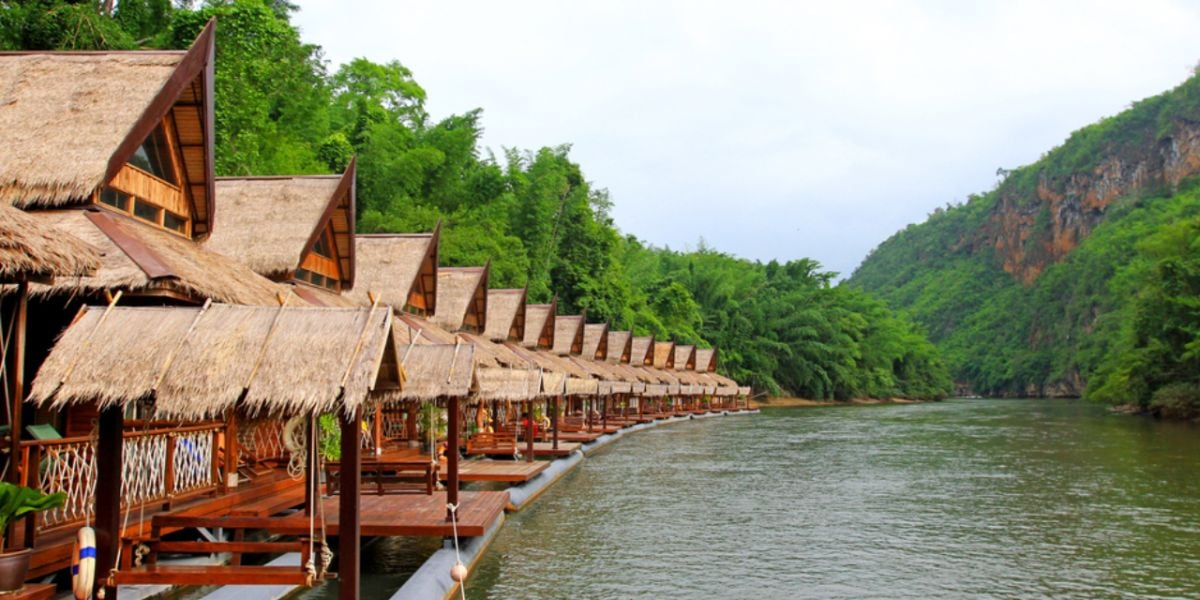
If you are about to move to Thailand, one of the first things to look into would be where you will live. Thailand is known for its budget-friendly cost of living — and it is still the case. However, finding quality, well-priced accommodation is just as much of a challenge in Thailand as it is in any other country.
Below, we are looking into how to approach your apartment hunting in Thailand.
Why move to Thailand?
There are many reasons why you may be considering relocating to Thailand.
Many expats move here for the experience. Thailand is an exceptionally interesting and diverse destination with a lot to see. From full moon parties to yoga retreats and busy cities to hidden temples, Thailand has something for everyone.
Some people move here and search for new opportunities. Compared to most Western countries, Thailand offers a relatively low cost of living. This means that you will have the time to explore different career options, learn new skills, and gain experience working in an international environment.
Thailand is a great destination for digital nomads. If you work online and they're looking for a cost-efficient base to call home, Thailand won't disappoint. Chiang Mai is one of the world's most famous digital nomad hubs, with a large freelance community and lots of coworking spaces.
You may also be considering retirement in Thailand. The country offers easy visa options for those who want to settle here in their 50s and above.
Whatever your reason for moving to Thailand may be, one of the first things you will need to do is find the right accommodation. After all, where you choose to settle can make or break your Thailand experience.
Here are some basics for renting or buying accommodation in Thailand.
Types of accommodation in Thailand
Thailand has developed rapidly over the past few decades, and as a result, it is not difficult to find comfortable accommodation. There are four main housing options in Thailand — serviced apartments, condominiums, townhouses, and freestanding houses — and there is something that will suit most budgets and needs.
Serviced apartments offer a range of services, such as changing bed sheets and cleaning, which makes it popular among single expat professionals. Condominiums don't include additional services but do tend to come with amenities, such as a swimming pool or gym. Townhouses are more affordable than detached houses, but both these types of accommodation provide more space for a lower price than many luxury condominiums.
How much is rent in Thailand?
By European, North American, or Australian standards, rental prices in Thailand are quite reasonable. However, there are still disparities depending on location. For example, housing in outer Bangkok is cheaper than in central areas like Sukhumvit but still a lot more expensive than housing in Chiang Mai.
Accommodation in popular tourist and expat communities, such as Pattaya or Phuket, is also more expensive than on quieter islands, such as Koh Lanta.
As accommodation does tend to be quite affordable for many expatriates living in Thailand, many also choose to spend money hiring a housekeeper or even other members of staff, such as a driver. The cost of a live-in maid (known as a mae baan) can be relatively affordable as it ranges from THB 15,000 to THB 20,000. The hired mae baan will take care of your children, cook, clean, wash, and iron for you. However, be aware that it is considered inappropriate to let somebody wash your underwear and socks for you in Thailand, so you will need to do this yourself.
Choosing accommodation in Thailand
Most accommodation in Thailand comes with basic features, such as air conditioning, a bed, and a closet. However, hot water isn't always standard in older dwellings. Accommodation without hot water is much cheaper, but if you cannot cope with it, you should enquire about it before moving in.
You can also opt for furnished or unfurnished accommodation, although unfurnished accommodation will be considerably cheaper. As furniture isn't particularly expensive in Thailand, especially if you buy local products, then choosing unfurnished accommodation could be a better option if you're looking to live in Thailand on a long-term basis. When you move into your new home, you should be sure to prepare your two-month advance and one-month deposit amount and sign a contract with an inventory that lists all the furnishings provided and the general condition of the accommodation.
Good to know:
Unless specified in the lease agreement, water, gas, and electricity are not included and must be paid in addition to your monthly rent.
Before renting your accommodation, it is advisable to check that any outstanding utility bills have been fully paid by the previous tenant.
The most common way to pay bills in Thailand is through your mobile banking app. You can scan the barcode on the bill and pay right through your banking app, or you can search for the biller and transfer the money. If you live in a condominium, you can often pay at the front desk of the building for a charge. 7-Eleven stores are located everywhere and are open 24 hours a day. Moreover, if you are staying in an apartment, you usually pay it to the landlord directly.
For day-to-day living needs, you will most likely need to buy a gas bottle and a water cooler. Tap water isn't safe to drink, so the most efficient way to get around this issue is to hire the services of a company that will deliver bottles of drinking water to your home on a weekly basis and remove empty bottles. Also, some apartments and condominiums do have water dispensers wherein you can refill your water jugs and bottles.
How to rent accommodation in Thailand
To rent accommodation in Thailand, you will usually need to provide a copy of your passport, a copy of your work permit, and proof of income. If you are renting a property through a real estate agency, you may be subject to a credit check and be required to provide a character reference from your employer.
Generally, rental agreements last for 6 months to one year. However, the duration of the lease and the rental price are negotiable with the owner and can start from 3 months. Generally, a lease and security deposit are all that is needed to secure property in Thailand. In most cases, you can expect to pay a two-month deposit along with the first month's rent. However, some Thai landlords request a three-month deposit. At the end of the lease, the deposit should be returned as long as the property and furnishings are in good condition. If you leave before the end date of your lease agreement, you will forfeit your deposit unless specified in the contract.
Take note that foreigners are not allowed to use their rented accommodation for commercial purposes and are not allowed to sublease either, as it is a violation of Thai law (Condo Act Sec 17.1 as follows):
"In the case where a space in the condominium is set aside as a place to carry out the business, the system on entering and exiting such area shall be specifically set up in order to prevent the disturbance on the peaceful enjoyment of the joint owners.
No person shall be permitted to engage in any trade transactions in the condominium except it is a trade transaction in the area of the condominium designated in accordance with paragraph one) that disallows condominiums and apartments for short-term renting".
How to find accommodation in Thailand
Unfortunately, not all properties are listed online in Thailand, so while the Internet is a good place to start, it isn't always the most reliable way to find accommodation. The properties that are listed do tend to be the more expensive ones and aren't always listed very clearly. However, certain websites are worth browsing as they do have rentals listed in English.
If you are already in Thailand and looking for accommodation, then it is a good idea to ask locals and other expatriates. Once you have decided on the area that you want to live in, explore it yourself before making any decisions. Once you have found accommodation that interests you, it is worth trying to visit it at different times of day and at the weekend, as many people turn their house into a business during the day, and you need to make sure you are happy with the neighbors.
If you like a condominium, you can inquire at the building management centre about any apartment available for lease.
English-language newspapers, such as The Bangkok Post or the Chiang Mai Mail, also have property classified sections that are useful for browsing to get an idea of prices and availability.
The most convenient way to secure accommodation in Thailand is probably to contact a real estate agent, but most agents tend to dedicate their time to rentals over THB 30,000. Real estate agents in Thailand work off of commission, which is paid by the property owner. So you won't have to pay any real estate agent fees.
Buying property in Thailand
If you are looking to buy a house in Thailand, be aware that certain restrictions apply to expats. Check with your real estate agent or a local attorney before making any decisions.
Foreigners are not allowed to own land outright in Thailand. However, Thai law allows foreigners to buy a condominium as long as they pay for it in foreign currency. Alternatively, foreigners will need to invest at least THB 40 million in the Thai economy to legally be able to purchase a private residence of up to 1,600m² in the country. Those wishing to buy or build their own house usually do so through their Thai spouse or business partner.
Due to these restrictions, many foreigners prefer to secure a long-term lease agreement. The law allows leases of up to 30 years, but if you sign a 30-year lease, make sure it is registered so that you will have recourse if your landlord tries to evict you prior to that time.
Good to know:
Leases are only valid for 3 years if they are not registered at the Land Department.
Many leases contain renewal clauses that provide for a renewed 30-year lease once the initial 30-year period comes to an end. A renewal clause is a promise to renew a lease. Still, it is important to understand that it does not always mean an automatic renewal, as your landlord's cooperation is tantamount.
Useful links:
We do our best to provide accurate and up to date information. However, if you have noticed any inaccuracies in this article, please let us know in the comments section below.








